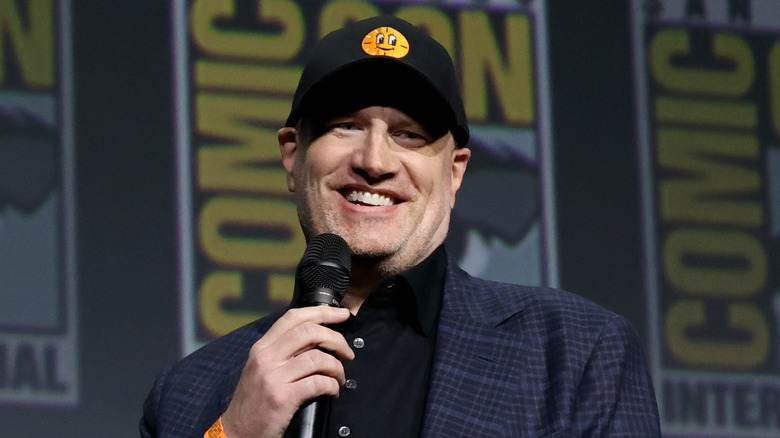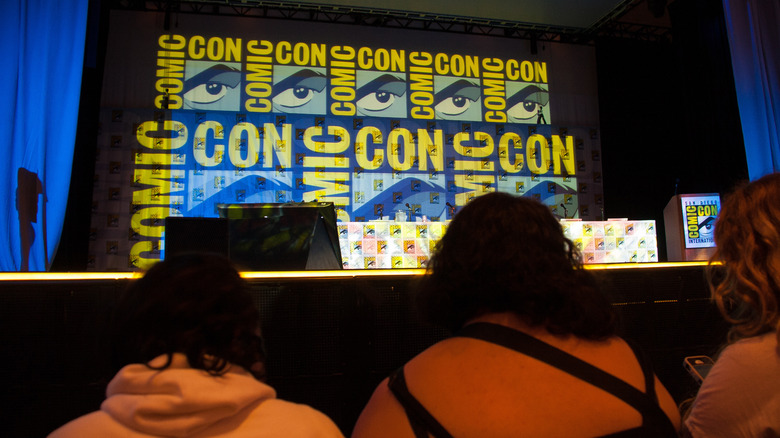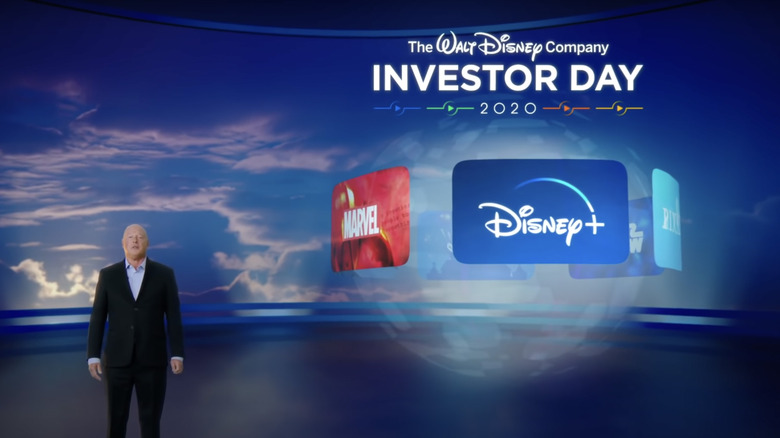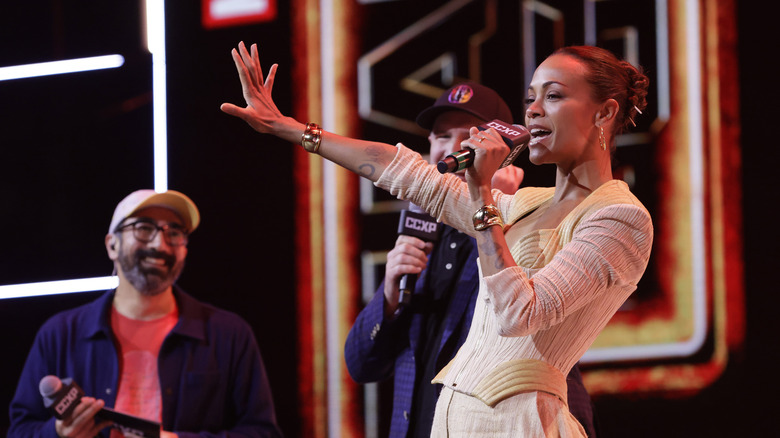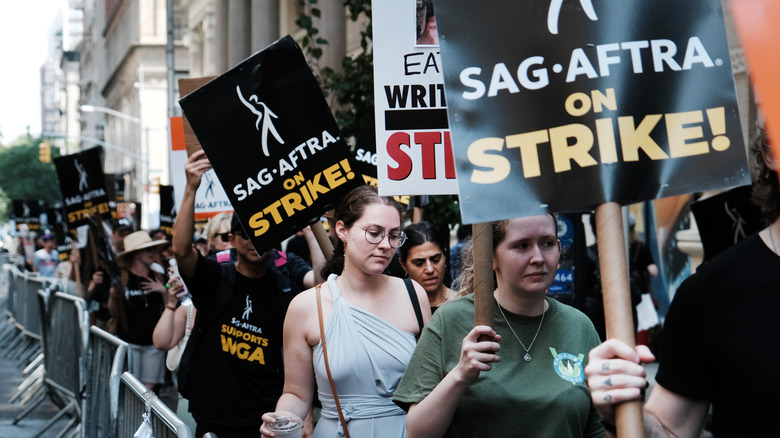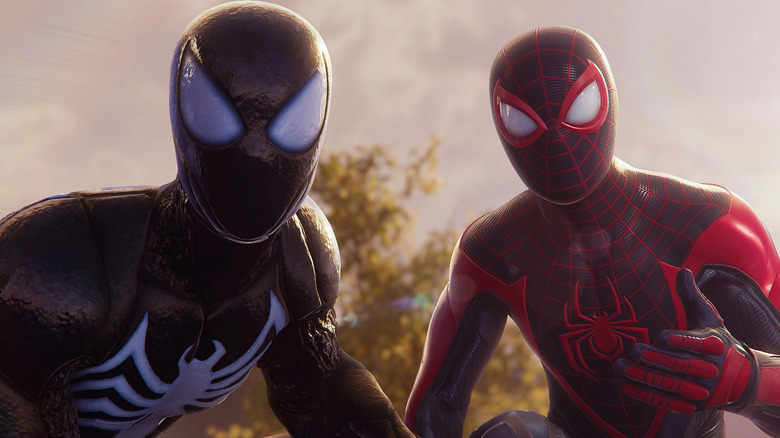Yes, Comic-Con Is Dying, But The Signs Have Been There For Decades
No event has fascinated comic book purists and blockbuster junkies more than San Diego Comic-Con. Considered a mecca for geekdom, the iconic convention continues to host thousands of fans across the globe, who come dressed as their favorite characters, in hand with comic books and collectibles ready to be signed by some of the world's biggest icons. For many, going to Comic-Con is a once-in-a-lifetime opportunity, a rite of passage that involves taking photos with your childhood heroes and meeting fellow fans with likeminded interests.
For independent creatives and artists, it has functioned as the perfect place to network, build a fanbase, sell a few products, and workshop with other creatives. And for studios and other creative giants, it's been a boon for fueling hype — an opportunity to make announcements and debut new footage from the latest television show or blockbuster. In the last two decades, San Diego Comic-Con has become the place to market and promote anything with an IP or sci-fi trappings or fantasy flare. After all, the response is typically overwhelmingly positive, based purely on the audience in attendance.
SDCC has been the perfect marriage of fandom and marketing, where the love of all things geek and money could come together. But that once prosperous marriage is breaking apart, and the signs have been on the walls for decades. Recent years have shown that studios, companies, and even independent creatives can connect with fans online without paying exorbitant exhibition fees. Beyond that, with local and international conventions popping up, SDCC's global fandom has little to no incentive to book those pricy flights and hotels. And, in the wake of the COVID-19 pandemic and the recent SAG-AFTRA strike, studios have proven that they can find alternative ways to promote their most significant projects.
San Diego Comic-Con isn't unique in a digitally connected world
Beyond its capitalistic efforts, the purpose of San Diego Comic-Con has always been to connect likeminded fans and creatives together. In the '70s, SDCC was the closest thing consumers and creators had to a meeting ground. Info spread around through newspaper clippings and word of mouth that the convention was the place to be, which is how SDCC slowly but surely grew into the current behemoth it is now. Fans lucky enough to attend the event in its early days had the privilege of meeting some of their favorite creatives, coming back home to share interesting tidbits and pieces of trivia that no one else knew.
But it's 2023 now, and fans don't need to fly halfway across the world (or country) to connect with their fellow "Star Wars" or "Lord of the Rings" fans. In fact, it doesn't require much effort these days to find a community thanks to the internet. Head to social media sites like Reddit, Twitter, or even the lingering specter of internet message boards, and fans can immediately start chatting away with fellow geeks and fans, creating an intimate and personal connection over media without having to leave their homes.
For independent and small-time creatives, having the opportunity to connect with their fanbase over the Internet has drastically reduced costs. As San Diego Comic-Con continues to be the flagship con, small and independent artists and creatives are getting priced out — forcing them to skip the event altogether. Luckily, social media has filled that void, where they can connect directly with fans, and even market and sell their content directly to consumers. This direct-to-consumer model allows creatives greater control of their finances, allowing them to focus on what truly matters: their art.
Digital panels and events are slowly replacing Comic-Con
It's not just fans and creatives who are flocking online — it's also major entertainment brands and studios. The decline of San Diego Comic-Con as a viable marketplace for companies to showcase their forthcoming content isn't anything new. E3, which was once the world's largest video game trade show, is no longer as relevant as it once was. A once prosperous trade show where major companies like Sony, Microsoft, and Nintendo would hold major preview events has now been reduced to a nostalgia-eliciting thought. While there are a number of reasons why E3 is dead, the main reason is simple: companies can hold their own virtual events, without having to pay massive exhibition fees. Sony, Microsoft, and Nintendo, for example, pulled out of E3 simply because they don't need it.
Instead, they can communicate with fans directly on platforms like Twitch and YouTube, where they can stream showcases for their upcoming slate of video games. For Sony, it's their trademark "State of Play" live streams, where they directly tease upcoming PlayStation titles. And Nintendo, who pioneered the model, shines every couple of months with pre-recorded virtual events, titled Nintendo Directs.
Companies in the film, television, and comic landscape are taking note, realizing that they don't need SDCC's iconic Hall H to tease what's coming next. Remember the entirely virtual Disney Investor Day 2020, when the media giant announced over a dozen films and television shows, setting the internet aflame? Marvel Studios even got in on the fun, debuting new looks at "WandaVision" and more. It was an entirely online event, one that directly spoke to fans around the world. For Disney, the virtual event was an experiment, packed with reveals and debuts, and it'll likely be the first of many.
Local and international cons are replacing SDCC
While virtual events and online connections have made San Diego Comic-Con less of a must-go event, it doesn't mean that conventions are over. In fact, as geekdom becomes more pronounced, conventions are only becoming more popular around the world. This means that fans, who once lived in smaller markets, have no need to fly to San Diego, and pay exorbitant lodging prices, to meet their favorite actors and creatives. While SDCC will likely remain the flagship convention for many, it's not the only convention in town.
Large markets are accommodated thanks to New York Comic Con and Fan Expo Chicago, but its conventions in smaller markets like Ohio and Salt Lake City make marquee events like SDCC less appealing. Why shell out thousands in flights, hotels, and food if the convention in the next town over is just as appealing? Sure, smaller markets won't boast huge announcements from the likes of Marvel and DC, but the truth is, the average con-goer doesn't even get an opportunity to be in those rooms because of how long and arduous the lines are. Why sacrifice precious time waiting in line just to see Marvel Studios boss Kevin Feige announce the next "Avengers" film, when the news will hit Twitter in a matter of seconds?
Conventions are no longer just a stateside affair, either, with events in Asia and South America growing rapidly. One key market is Brazil, which hosts the annual CCXP in São Paulo. Now the world's largest fan convention, CCXP is emerging as the go-to place for studios and entertainment giants to debut new content. CCXP 2022 saw various debuts, with stars like Zoe Saldana, Keanu Reeves, and creatives like Feige showing up to promote their latest offerings. São Paulo has also become home to Netflix's annual fan event Tudum — which also happens to have a significant online presence.
The COVID-19 pandemic and SAG-AFTRA strike have accelerated SDCC's decline
The harsh reality is that San Diego Comic-Con no longer boasts the allure it used to. During the COVID-19 pandemic, cons around the world were canceled. Creatives and companies found alternate ways to communicate with fans, resulting in virtual events and streams. While conventions are making a comeback, it doesn't make sense for many to head to San Diego. Local conventions boast favorite creatives and interesting panels, and while blockbuster debuts and announcements from the likes of Marvel and DC used to be reserved for SDCC, that's no longer the case in 2023, as the SAG-AFTRA strike has forced a number of marquee panels featuring key talent to get the axe.
If talent can't show up on stage to promote upcoming projects, the value of SDCC diminishes. For comic purists, this is a win, as it means that SDCC is no longer just a cog in a studio's marketing machine. While it remains to be seen how long the SAG-AFTRA strike lasts, one thing is certain: SDCC is straight up not having a good time. The convention was forced to close its doors for two years during COVID, and while 2022 was a success, 2023 will feel muted and isolated. Meanwhile, Netflix and Marvel have proven by now that they can drum up genuine anticipation from other sources. And the truth is that they no longer need Comic-Con. Chances are, once the strike is over, future conventions won't have the same headlining acts they used to.
Even if the old Comic-Con is dying, it may be resurrecting in a new form
Even though this year will be light on star-studded affairs and jaw-dropping announcements, San Diego Comic-Con has lost its dominance. While it will feel more intimate this year, especially without the star-power that Marvel and DC bring, that doesn't mean it's being abandoned. One of the most exciting things to happen at Comic-Con this year is a Hall H panel dedicated directly to the PlayStation 5 video game "Marvel's Spider-Man 2." In an otherwise crowded year, the PlayStation exclusive would not dominate the conversation during SDCC weekend. As E3 loses momentum as the go-to in-person trade show for video games, and gaming giants like Microsoft and Nintendo pivot to online-only events, attending the "Spider-Man 2" panel is a must for PlayStation fans. It's one of the few in-person occasions where fans of the genre can interact with their favorite creatives.
It's not just video games that may replace the old Comic-Con of yesteryear. International productions know the value SDCC has, especially when it comes to amplifying genre and niche content. Deepika Padukone, Amitabh Bachan, and Prabhas, some of India's biggest stars, are heading to SDCC to debut "Project K," one of the country's most-anticipated sci-fi films. The convention is still a viable launchpad for international projects like these, giving Western viewers a first look at some of the world's most interesting genre offerings.
SDCC could be dying, but if all goes well, it can return to its comic book roots, and also become a safe haven for video game fans who no longer have many in-person events to flock to. And as Western audiences look beyond domestic genre fare, SDCC can become a global launchpad for international artists and creatives.
